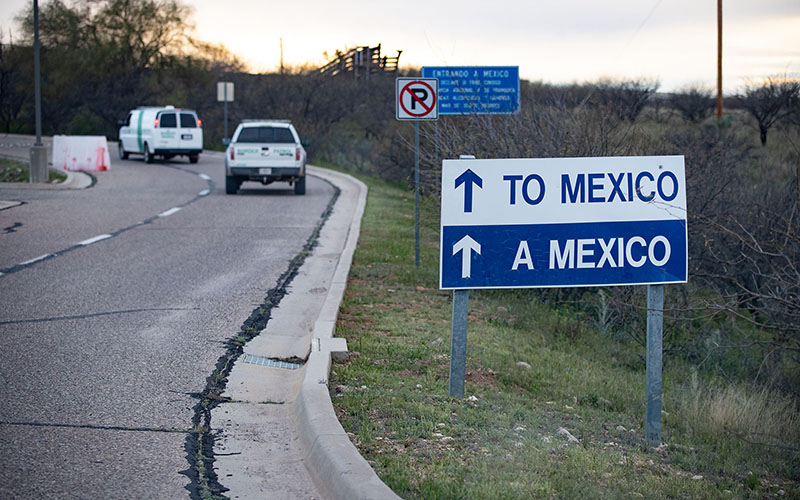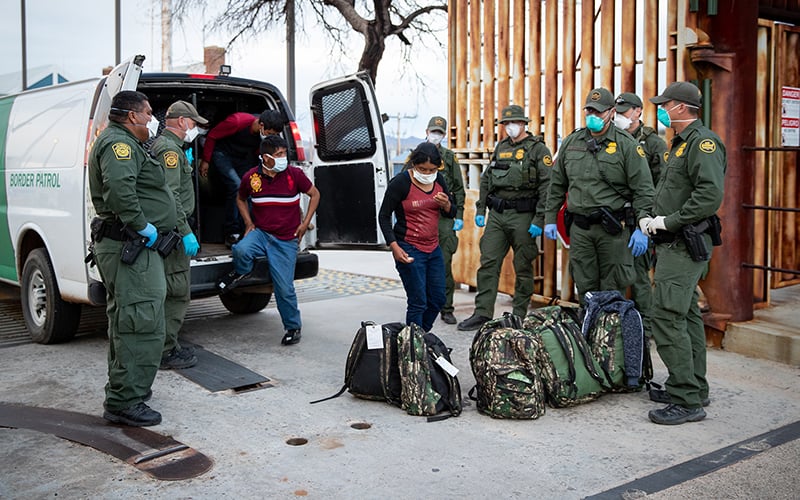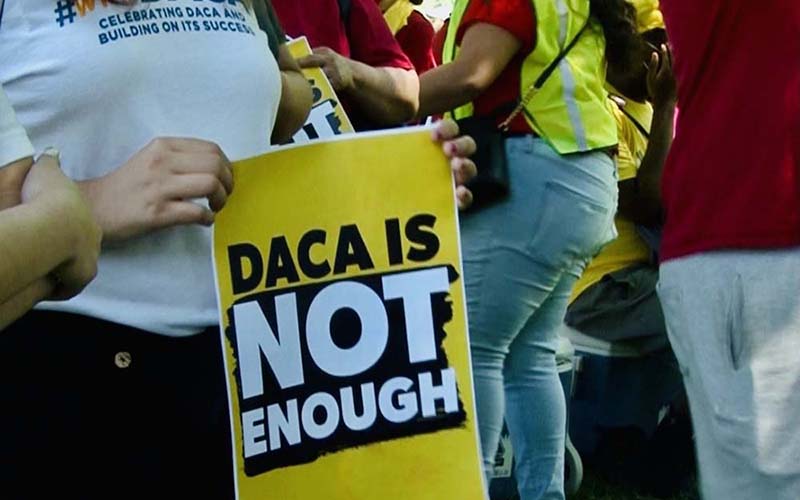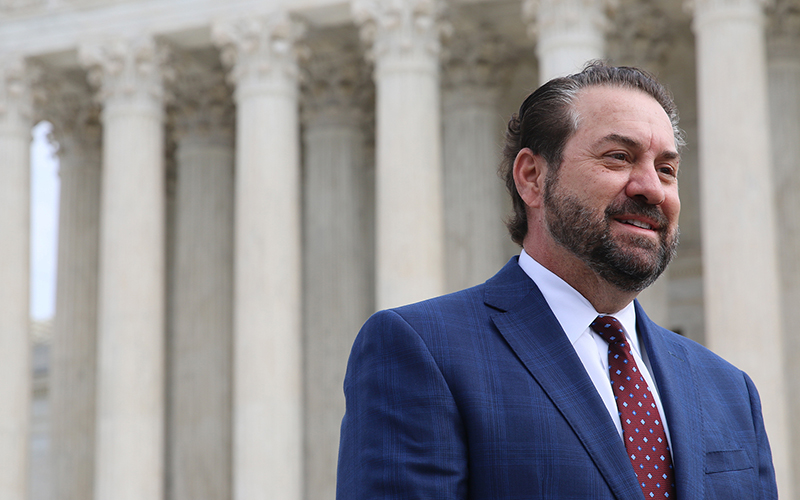WASHINGTON – The Supreme Court on Thursday said the Biden administration can terminate a Trump-era policy that let the U.S. turn away asylum seekers at the southern border and force them to wait in Mexico for their court proceedings.
In its final ruling of the term, the 5-4 court said the Biden administration was within its rights to end the Migrant Protection Protocols, also known as the “remain in Mexico” policy, overturning lower courts that had ordered the program to continue.
Immigration advocates had long criticized the policy that they said exposed migrants to violence and illness in makeshift camps south of the border, and President Joe Biden targeted it for elimination on his first day in office.
“It’s a big victory and it’s a welcome relief for what has been a very disappointing and difficult fight to try to get rid of a quite brutal policy,” said Noah Schram, a border strategist for ACLU Arizona.
But while some advocates and policymakers urged Biden to end the program as soon as possible, others repeated concerns that the government does not have a plan in place to handle the increase in migrants that could come from lifting it.
Sen. Kyrsten Sinema, D-Ariz., said in a statement that “the administration must ensure a comprehensive plan is in place and Arizona has the necessary resources before ending Migrant Protection Protocols.”
“Arizona communities bear the brunt of the federal government’s failure at our border,” Sinema’s statement said. “I’ll continue holding the administration accountable to help secure the border, keep Arizona communities and migrants safe, and ensure migrants are treated fairly and humanely.”
The ruling comes as border apprehensions have surged to their highest levels in decades, with more than 1.5 million migrants stopped at the southern border so far this year, according to the latest numbers from Customs and Border Protection. Of those, 385,631 were stopped in Arizona, CBP said.
The number of migrants subject to MPP is relatively small by comparison, numbering in the tens of thousands since the program began in January 2019. Those numbers have been declining since February 2021, as the Homeland Security Department has been winding the program down, even as it has been under court order to make a “good faith” effort to keep it running.
Biden directed DHS in January 2021 to end the program, and Homeland Security Secretary Alejandro Mayorkas released a memo June 1 officially ending the program. He said it was costly, dangerous for the migrants, distracted border officials from other responsibilities and was interfering in U.S. relations with Mexico.
Texas and Missouri sued, arguing that they would be burdened with the cost of undocumented immigrants if the policy ended. They also argued that DHS did not have the capacity to detain all the asylum seekers, as the law requires, so it had to keep MPP as an option.
Federal district and circuit courts agreed, saying Mayorkas had failed to follow proper procedure before ending the program. When Mayorkas mounted a new review of the policy, again reaching the same conclusion in October that it should be ended, the courts dismissed it as after-the-fact rationalization.
But the Supreme Court disagreed. Chief Justice John Roberts said the plain language of the law – that the government “may” release asylum seekers back to Mexico – did not require that Biden keep the plan in place.
“The statute says ‘may,’” Roberts wrote in the majority opinion. “And ‘may’ does not just suggest discretion, it ‘clearly connotes’ it.”
In his dissent, Justice Samuel Alito said that ignored the requirement that asylum-seekers be detained. The majority, he wrote, seems to think “it is fine for DHS simply to release these aliens en masse and allow them to disappear.”
That fear was echoed by immigration hardliners, who said the asylum system is being abused as a way to “just get into the country without having a legitimate claim.”
“It’s going to incentivize more of the chaos that has gripped not only the border states but the communities that are affected by that,” said Preston Huennekens, a spokesperson for the Federation for American Immigration Reform.
The White House did not comment on Thursday’s ruling. Mayorkas said in a statement that DHS “would continue our efforts to terminate the program as soon as legally possible,” with no other details.
But advocates said there is no time to waste.
“The Biden administration must move to immediately terminate Remain in Mexico,” Rep. Raul Grijalva, D-Tucson, said in a statement.
Eliminating MPP would end the violence that migrants faced in border towns while waiting their day in court, advocates said. Reports have shown that asylum seekers were often targets for murder, rape, extortion and other violence in the makeshift camps, which lacked proper sanitation.
“Criminals in those cities tend to target migrants in particular,” said Jessica Bolter, an associate policy analyst for the Migration Policy Institute. “They’ve faced dangerous conditions.”
Bolter said it would also give migrants access to legal representation in the U.S., stronger technology and safer housing. Those conditions “really impact the likelihood that they’ll (migrants) succeed in their cases in the immigration courts,” she said.
She cited numbers from the Transactional Records Access Clearinghouse that showed just 5% of migrants in MPP between December 2021 and May 2022 had legal representation, the lowest rate among the different groups of migrants seeking legal help with their immigration cases.
Remain in Mexico is just one of several border policies that advocates say the Biden administration needs to act on, including ending Title 42, which cites COVID-19 as a public health reason for rejecting migrants.
“The Remain in Mexico program is only one piece of a larger, very harmful infrastructure that the Biden administration has unfortunately decided to maintain that makes it very, very difficult to … seek protection in the U.S.,” Schram said.
The administration tried to end Title 42, but a federal court blocked that attempt in late May.
The Supreme Court ruling came just days after 53 migrants were found dead Monday in a tractor-trailer in San Antonio, Texas, in what is being called the deadliest human smuggling incident in U.S. history. Grijalva referenced those deaths as he called for widespread immigration reform.
“Now is the time to fix our broken immigration system and ensure a process that is just, humane and fair,” he said.




